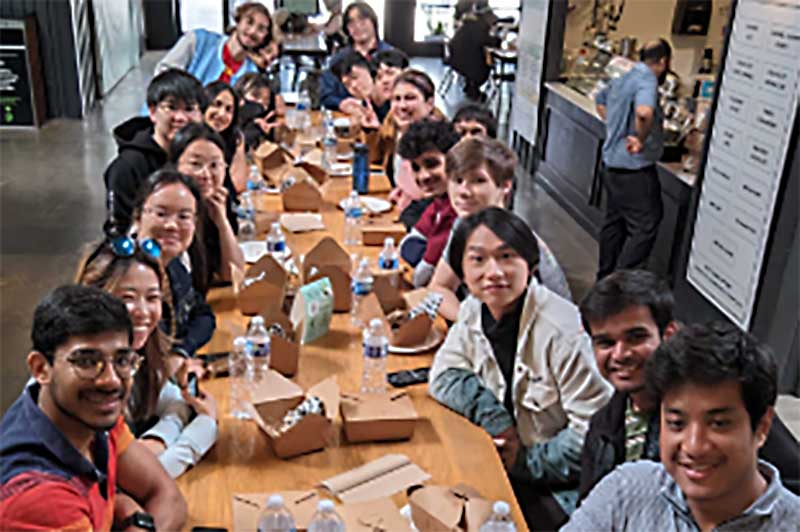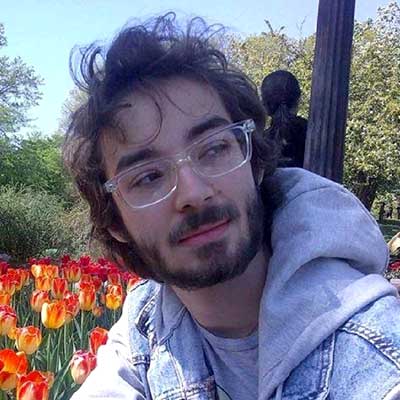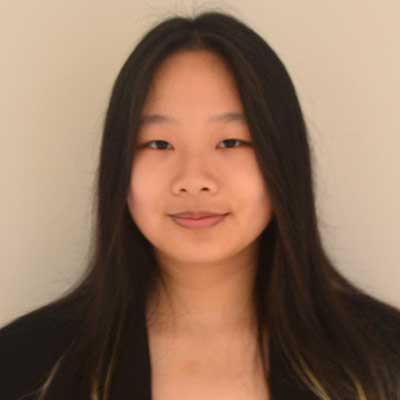Khoury News
In Oakland, Khoury students build computing clubs to connect, compete, and collaborate
Now entering its third year under the Northeastern umbrella, the Oakland campus boasts a growing student club scene, thanks largely to incoming students who saw a need — and an opportunity.

At Northeastern’s Oakland campus, which has only existed in its current form since 2022, most things are new, including the campus’s nascent student life.
Danny Sklyarevskiy, a first-year computer science student, knew before he even got to Oakland that he wanted to help the campus’s community in some way. So when he realized that the campus didn’t have a computer science club, he hopped on to one of the new-student group chats and proposed the idea. Shortly after, Dharana Alilaikannan, a first-year combined computer science and business major, reached out to Sklyarevskiy and the two started organizing the CS Coalition.
“The first couple of months, Dharana and I worked a lot on making sure that the club had a solid base and knew how to organize any events we wanted to,” Sklyarevskiy said.
Building that solid base required a lot of work from the club’s e-board, which began by organizing weekly tutoring sessions.
“A lot of people here are very new to computer science; other people have a lot of experience. So, we got the people with a lot of experience to help mentor the newer students on homework,” he said.
Initially, getting people to attend these sessions was difficult — not because people didn’t need the help, but because it was hard to advertise the events. Newly minted club leaders across campus were figuring out the best ways to get the word out.
Eventually, the CS Coalition asked teachers to mention the club during their classes — and students started showing up.
As the club grew, it faced another challenge. Computer science students couldn’t share their homework assignments, meaning the study sessions were largely overviews of general questions rather than more individualized help. The coalition wanted to provide more specific support, so Sklyarevskiy reached out to faculty to change these rules.

“I started talking to the teachers and I was like, ‘It’s very hard to tutor when we can’t look at students’ code. Looking at the code is like a huge part of helping,’” Sklyarevskiy said.
Eventually, this led to the development of Peer Programming, a program unique to the Northeastern network, and one that Sklyarevskiy considers to be the CS Coalition’s greatest accomplishment. Beyond that, the club has hosted game jams — where groups and individuals compete to program games within a brief time — and helped organize PawHacks, a hackathon on the Oakland campus.
During this same time, another CS club emerged on the Oakland campus. It isn’t breaking news that there are serious gender disparity issues within STEM fields, and computer science, where just 20% of professionals are women, is no exception. For students like Jasmine Yuen, a first-year computer science major in Oakland, these disparities are a major concern. So to address them, Yuen wanted to start a campus chapter of Girls Who Code, an international nonprofit working to close the gender gap in tech sector.
“The gender disparity in a lot of different fields that are dominating the market right now is a really important issue,” Yuen said. “I believe that all individuals should have equitable access to education.”
After floating the idea, Yuen and her friends formed the club and quickly filled its e-board positions, with Yuen becoming president.
“The biggest challenge was that none of us had leadership positions before,” Yuen said. “We were very unsure if we were fit for this big role … I think the way we overcame that was that we fully supported each other … with all the responsibilities.”

The majority of Girls Who Code’s work is done through weekly study sessions, which the club usually schedules the day before major CS assignments are due. In these sessions, students work together to figure out these assignments, as well as general concepts they’re struggling with. These meetings also allow women within the computer science program to come together and develop deeper bonds.
“A lot of the girls started talking to each other, and they socialized a lot during the meetings,” Yuen said, noting the importance of friendship building in making women feel more welcome in predominantly male fields. “I think the most important thing for girls entering computer science is finding people who you can rely on and will always support you.”
Though the e-board members of both the CS Coalition and Girls Who Code departed Oakland after the spring semester, they are determined to keep the clubs running in Oakland. Sklyarevskiy, now studying in Boston, will help develop computer science clubs at the Oakland campus as the global campus ambassador for Kaleidoscope, a computer science club consortium at Northeastern. Yuen, now a student at Georgia Tech, is working with her former e-board colleagues to convince incoming Oakland students to join Girls Who Code and make it permanent.
READ: Inside Kaleidoscope, the student-led council supporting and uniting Khoury College clubs
“We want to continue to serve the Oakland campus for years to come,” Yuen said.
The Khoury Network: Be in the know
Subscribe now to our monthly newsletter for the latest stories and achievements of our students and faculty